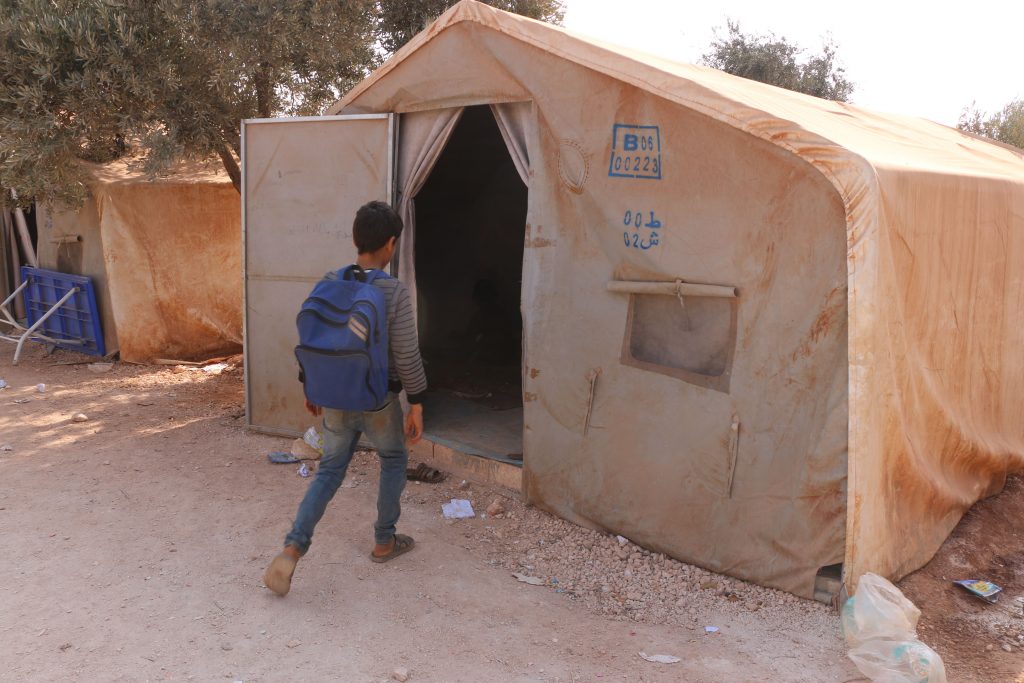Every morning, Mohammed Bilal Dulaimi, a child, walks out of his tent and heads to the al-Hertmiyya camp where he attends school. The school is an educational tent housing and teaching children who live in the camps, with limited resources.
The displaced child, Mohammed, from the city of Saraqib, east of Idleb, traveled a distance of 2 kilometers from the al-Qasha camp in the vicinity of the town of Kafrihmol, north of Idleb, to reach his school in another camp. This is due to the absence of a school designated for his camp.
On the road between the olive trees, where several camps for the displaced have spread around the town, Mohammed encounters his colleagues from other nearby camps who have lost their homes and schools. Each of these colleagues found a new way to teach in the educational tent.
The educational tent has become a haven for camp children, at a time when traditional schools are absent from a large number of informal camps, despite the crisis experienced by the staff of this educational tent in terms of securing monthly salaries, logistical equipment, and other needs of the educational process.
According to the Education Directorate’s figures, about 151 schools are deployed in the Idleb governorate, 61 of which operate voluntarily.
Mohammed, who is in the fourth grade, explains to al-Souria Net that his studies in a tent are no different from his reality at home, which also became a tent. He hopes to return to his life in his hometown, Saraqib.
No seats and stationery
Dozens of first-grade children gather in the al-Hertamiyya school, carrying the same name as the camp, where there is no second class for the previous students. During the educational session, their teacher tries to accommodate the numbers and provide a decent educational environment.
Read Also: What’s Left of the Privacy of the Women in the Camps of Idleb
Classroom congestion is not the only obstacle to the educational process in the educational tent, the lack of seats also comes as an additional obstacle to students, who lay on the ground during classes.
Ibrahim al-Shamali, the school’s principal, told al-Souria Net that they lost all their equipment after being displaced from the village, due to attacks by Assad forces and Russia. They were only left with the necessary records for students and the school, which led to their lack of all the requirements of the educational process.
He points out that the most basic elements of the educational process are absent from the “tent”, like furniture or seats and blackboards. Even the carpets on which students sit are donations from parents, due to the difficulties of securing stationery for students who are unable to buy them.
“Closing the tent door is their only way to secure some heating amidst the cold winter nearing,” he said.
Volunteer teachers
Jumaa, a class teacher at the school, has been volunteering for about two years in the educational tent, without receiving any salary or financial compensation.
He tells al-Souria Net that he has received promises of financial grants or relief baskets, but nothing has happened so far.
Many of the school tent’s teachers are suffering from a “volunteer crisis”, due to the absence of donors covering shortages and granting salaries.
Jumaa talks about the teachers’ suffering as well as volunteering during the lessons, which are negatively affected in the absence of educational needs, most notably stationery.
“Some students don’t write down their lessons, because they don’t have stationery such as notebooks and pens. Their families are financially unable to provide these items for their children,” he said.
This article was translated and edited by The Syrian Observer. The Syrian Observer has not verified the content of this story. Responsibility for the information and views set out in this article lies entirely with the author.


